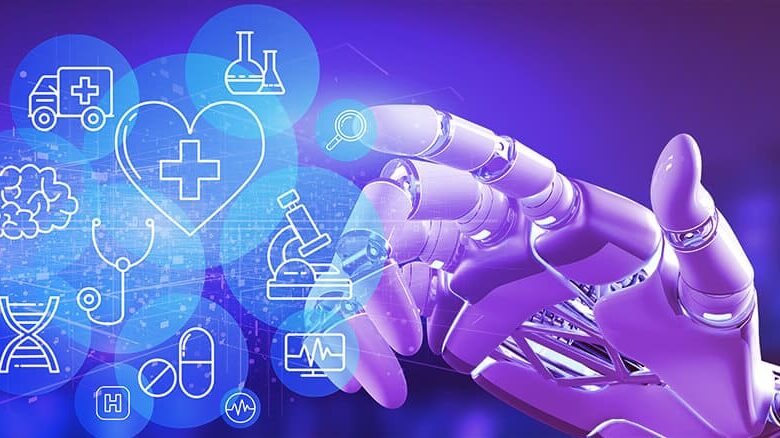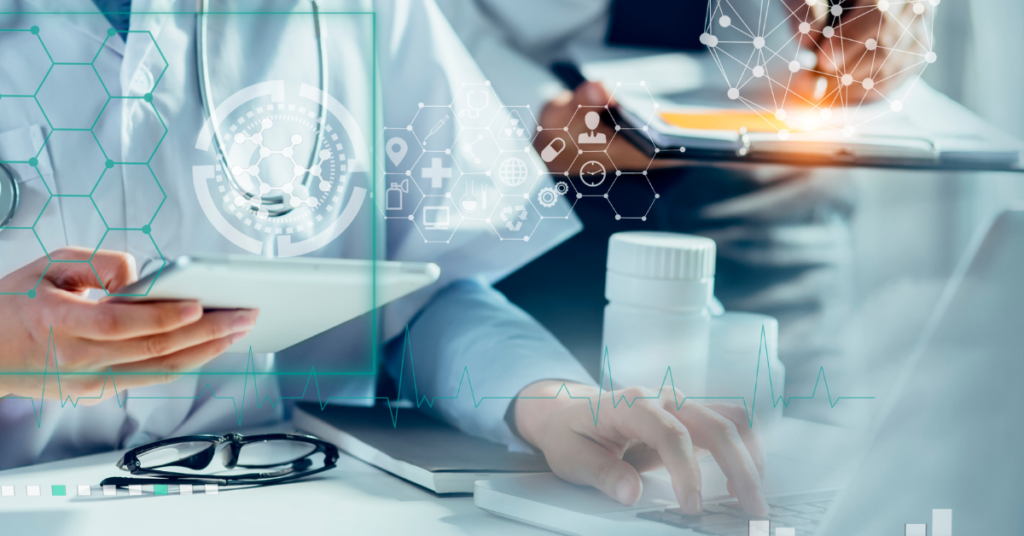
Healthcare is one of our major requirements that are urgent and time sensitive. One may not need it every day, but every day someone definitely needs it. It is very important to consult a medical practitioner and get the diagnoses done if someone faces deterioration in health. This helps with early disease detection and treatment. However, there are various reasons due to which many people keep delaying a doctor’s visit like time constraints, distance, traffic, busy schedules, etc. This leads to aggravation in the issues which, if addressed in time, can be treated easily.
This calls for a solution that can bring healthcare to our fingertips. This is where healthcare applications come as the savior. These applications connect a person in need of medical assistance with healthcare service providers by helping them to obtain medical information, make appointments, monitor their vital signs, and receive remote consultations.

Healthcare mobile app development services are essential to create these cutting-edge solutions. This ensures that they meet industry standards while meeting complex healthcare needs. But as patient care and medical data get more sophisticated, healthcare providers face queries like:
• How can we analyze vast amounts of medical data in real time with accuracy?
• How can we automate routine healthcare tasks to improve workflow efficiency?
• What techniques can we use to guarantee personalized, data-driven patient care?
By gathering enormous data daily, healthcare organizations have become data-driven and AI in healthcare app development has become the central force that enables smarter and more efficient solutions.
With the help of healthcare AI solutions, organizations can analyze enormous amounts of medical data in real time, offering individualized treatment recommendations. This automates diagnostic procedures and makes remarkably accurate predictions about patient health patterns.
Role of AI in healthcare app development
1. Enhancing data analysis and predictive capabilities
- AI enables healthcare apps to analyze vast amounts of patient data with speed and precision. This offers actionable insights.
- AI-powered apps can recognize patterns, forecast health risks, and suggest timely interventions for improved patient outcomes.
2. Optimizing operational efficiency
- AI helps modernize organizational processes like appointment scheduling, billing, and patient triage.
- AI automates workflows. This minimizes errors in data entry, diagnostics, and other key areas of healthcare delivery.
- AI improves hospital resources, such as staffing, equipment, and scheduling and allows healthcare providers to focus more on patient care.
3. Improving patient experience
- AI-powered healthcare apps enable virtual assistants and chatbots to provide personalized support. These tools can answer medical questions, track symptoms, and guide patients through their care journey.
- Patients can access instant assistance. This eliminates wait times for basic medical advice or information.
4. Revolutionizing diagnostics
- These tools help in image recognition and natural language processing (NLP) to help with appropriate diagnostics.
- AI can analyze medical images, lab results, and patient notes. This helps doctors detect conditions early and prescribe personalized treatments.
5. Driving innovation and competitiveness
- Utilizing AI for developing healthcare apps position companies at the forefront of the industry.
- Businesses can develop cutting-edge apps with AI to meet the growing demands for personalized and efficient healthcare services.
AI technologies involved in healthcare app development
AI technologies transform healthcare app development as they enable the easy deployment of complex solutions that cater to both patients and healthcare providers. These technologies modernize processes and enhance the quality of care delivered, creating significant business opportunities in the rapidly evolving healthcare industry. A few technologies that can be incorporated into healthcare apps are:
1. Machine learning (ML) – Predictive analytics, continuous learning
2. Natural language processing (NLP) – Text and speech analysis, virtual assistants
3. Computer vision – Image recognition, telemedicine enhancements
4. Robotic process automation (RPA) – Task automation, process optimization
5. Deep learning – Complex data analysis, enhanced decision-making
Applications of AI in healthcare
Patient-oriented AI
AI-powered apps facilitate healthcare providers to offer personalized care, provide remote monitoring, and assist through virtual assistants.
- Diagnosis and disease prediction
- Remote patient monitoring
- Appointment booking
- Telemedicine apps
Physician-oriented AI
AI helps doctors with accurate diagnostics, predictive analytics, and automated tasks. This enhances patient care and clinical efficiency.
- Radiology and medical imaging
- Pathology assistance apps
- Clinical trials matching apps
- Electronic health record (EHR) enhancement apps
Admin-oriented AI
AI streamlines administrative processes, including billing and resource management, reducing operational costs and improving efficiency.
- Data and resource management
- Billing, claims and denial processing
- Patient admission and discharge
- Risk assessment and fraud detection
Pharma-oriented AI
AI accelerates drug discovery, clinical trials, and supply chain administration. This enables faster, cost-effective drug development and distribution.
- AI-powered drug discovery
- Clinical trial optimization
- Drug repurposing
- Logistics management
Use cases of AI in healthcare app development
1. Personalized treatment plans
AI algorithms analyze patient data to design personalized treatment plans. This enhances treatment effectiveness and patient satisfaction.
2. Virtual health assistants
AI-powered virtual assistants and chatbots answer medical queries, schedule appointments, and send medication reminders to patients. This improves user engagement and reduces the workload on healthcare staff.
3. Predictive healthcare analytics
AI in healthcare apps helps predict patient outcomes by identifying patterns in medical data. From predicting disease outbreaks to early detection of chronic illnesses, predictive analytics help healthcare providers make proactive, data-driven decisions, enhance patient outcomes and reduce healthcare costs.
4. Medical image analysis
AI-driven image recognition technology helps to analyze medical images such as MRIs, CT scans, and X-rays with significant accuracy. This speeds up diagnostic processes, enhances precision, and reduces the chances of human error.
5. Remote patient monitoring
AI-integrated healthcare apps can track a patient’s vitals in real-time to provide remote monitoring solutions for chronic conditions like diabetes and cardiovascular diseases. This continuous data flow allows for timely interventions and reduces hospital readmissions.
6. Drug discovery and research support
AI is accelerating drug discovery by analyzing vast datasets of clinical trials, research papers, and patient records. This reduces the time and cost associated with bringing new drugs to market.
Real-life examples of AI in healthcare app development
- Babylon Health is a cutting-edge healthbot. It employs AI to provide patients with medical consultations based on their own medical histories and common medical knowledge. Patients who want one can also receive a live video consultation with a doctor from Babylon Health.
- Wellstar MCG Health provides remote patient monitoring services by transforming their home into a virtual hospital. They provide top-tier care, cutting hospital stays, readmissions, and ER visits. This has helped them save up to $2.3M in healthcare costs.
- Pfizer used AI and machine learning to assist in developing a Covid-19 treatment called PAXLOVID.
- Ask NHS is a free app that helps you check symptoms, get health advice, and book appointments with your GP. It’s an easy way to manage your healthcare needs from your phone.
Benefits of AI app development in healthcare
1. Improved patient outcomes
2. Operational efficiency
3. Cost reduction
4. Enhanced user experience
5. Data-driven decision making
6. Scalability and innovation
Future of AI healthcare app development
The implementation of AI in healthcare app development will completely transform patient care and management through continuous monitoring, predictive healthcare, and tailored treatment in the future. AI integration with telemedicine, drug development, and improved system interoperability will spur innovation and present companies with new opportunities to boost productivity and services.
Despite obstacles like data security and integration, artificial intelligence (AI) is setting new norms with individualized therapies, predictive analytics, and remote monitoring. Companies can influence patient care in the future and take advantage of new market opportunities by integrating AI into healthcare apps with the help of mobile app development services. To stay ahead of the curve and transform patient care, embrace AI in healthcare app development now.





